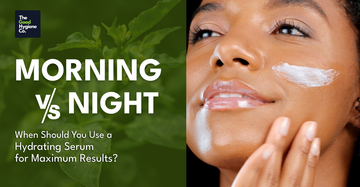For sensitive skin, timing isn't just a routine choice — it's biology.
If you have sensitive or reactive skin, you know the importance of a good hydrating serum. But one question remains for many: Should you apply it in the morning, at night, or both?
The answer isn't as simple as picking a time of day. It depends on your skin’s circadian rhythm, barrier status, and how hydration behaves within the skin across 24 hours. While you choose doctor-formulated skincare that’s grounded in research, understanding when to apply a serum can be just as important as knowing what to apply.
The Science of Skin Timing: Morning Vs. Night
Your skin isn’t static — it’s a living organ that follows a circadian rhythm. Scientific studies have shown that:
- During the day, the skin acts as a defensive shield — protecting against UV rays, pollution, and oxidative stress.
- At night, it shifts to repair mode, increasing cell proliferation, blood flow, and trans-epidermal water loss (TEWL).
TEWL is significantly higher at night, suggesting that skin loses more water while you sleep. (1) This makes evening hydration essential, especially for sensitive skin types with already compromised barriers.
What Is a Hydrating Serum Supposed to Do?
Unlike moisturizers, which are thicker and occlusive, hydrating serums deliver humectants like hyaluronic acid, niacinamide, or glycerin deep into the epidermis. These attract and retain moisture, making them essential for maintaining skin elasticity, calming irritation, and preventing microinflammation in sensitive skin.
For best results, a hydrating serum should be:
- Fragrance-free and alcohol-free
- Formulated with barrier-safe humectants
- Compatible with daytime SPF and nighttime repair creams
- Layered correctly to prevent TEWL
Morning Use: Prep, Protect, Prevent
Why Morning Hydration Matters
When you wake up, your skin is slightly dehydrated due to overnight TEWL. Applying a serum in the morning helps to:
- Replenish lost moisture
- Reinforce the skin barrier before exposure to environmental stressors
- Improve performance of sunscreen and antioxidants
Recommended Ingredients for AM Use:
- Hyaluronic Acid (HA): Attracts water into the stratum corneum and improves hydration immediately. Clinical studies have shown HA increases skin moisture and elasticity within 2 weeks. (2)
- Niacinamide (Vitamin B3): Strengthens the barrier, reduces redness, and supports ceramide production. It’s non-irritating and photostable — ideal for daytime wear.
Night Use: Restore, Repair, Rebuild
Why Nighttime Application Is Critical
At night, the skin enters its peak repair cycle, making it the best time for deeper hydration and skin regeneration.
- TEWL peaks overnight — sensitive skin loses more moisture
- Barrier repair mechanisms are most active during sleep
- Skin permeability increases, allowing better serum absorption
Recommended Ingredients for PM Use:
- Niacinamide (again): This multi-tasker reduces inflammation, improves elasticity, and enhances barrier repair. Night use helps improve cumulative hydration and redness reduction.
- Peptides & Postbiotics: Support microbiome health and collagen renewal — best reserved for nighttime due to their regenerative properties
Should You Use a Hydrating Serum Once or Twice Daily?
Sensitive Skin Guidance:
- Use it twice daily if your skin is dry, inflamed, or prone to eczema or rosacea flare-ups.
- Start with night use only if your skin is highly reactive or new to active serums.
- Introduce morning application gradually as your skin builds tolerance.
In a randomized, double-blind study, twice-daily niacinamide application improved hydration, barrier function, and visible texture more than once-daily use (3).
Application Technique: How to Layer for Maximum Absorption
Whether you’re using it morning or night:
- Start with a gentle, pH-balanced cleanser
- Apply hydrating serum on slightly damp skin — not wet, not dry
- Wait 30–60 seconds for absorption
- Seal with a moisturizer (occlusive) to prevent water loss
- AM only: Finish with a broad-spectrum SPF
This method is particularly effective for patients with barrier impairment, per dermatological guidance on atopic and sensitive skin care.
Summary: Morning vs. Night — Or Both?
|
Timing |
Benefits |
Best Ingredients |
|
Morning |
Hydrate, prevent TEWL, enhance SPF performance |
Hyaluronic acid, Niacinamide, Chamomile, Calendula (to calm and prep sensitive skin) |
|
Night |
Repair, reduce inflammation, barrier recovery |
Niacinamide, Peptides, Postbiotics, Calendula and Chamomile extracts to soothe nighttime sensitivity |
|
Both |
Optimal for sensitive, dry, aging skin |
Layer Hyaluronic Acid then Niacinamide, seal with moisturizer enriched with anti-inflammatory botanicals (Chamomile, Calendula) for 24-hour comfort |
Conclusion:
For sensitive skin, hydration timing isn’t just preference—it’s precision. Serums used in harmony with your skin’s circadian rhythm help maintain balance, protect against flare-ups, and accelerate recovery.
Morning = defense
Night = recovery
And for best results? Use both. Your skin will thank you for the consistency and care — especially when the formulation is backed by clinical science like the good soothng skin serum.
References:
1. Biological Rhythms in the Skin - 2016 May - https://pmc.ncbi.nlm.nih.gov/articles/PMC4926335/
2. Benefits of topical hyaluronic acid for skin quality and signs of skin aging: From literature review to clinical evidence - 2022 Oct - https://pmc.ncbi.nlm.nih.gov/articles/PMC10078143/
3. Nicotinic acid/niacinamide and the skin - 2004 Apr - https://pubmed.ncbi.nlm.nih.gov/17147561/
4. Improved clinical outcomes with moisturization in dermatologic disease - 2005 Dec - https://pubmed.ncbi.nlm.nih.gov/16869177/






